City Of Veins
Dusk settled over Threnith like a bruise, and Bertum descended into the spiraling gut of The Annals of Misread Intentions.
Entry Point 4 had warped again. The building's organic shell—that ancient, breathing architecture—had buckled inward, responding to something the creature had felt but failed to understand. The air was warm here, thick with the scent of old copper and blood-iron, the smell of a body working too hard to digest something it shouldn't have swallowed.
Bertum moved carefully through the argument-solidified corridors, his Vein-Blood pulse-orb casting cold blue light across walls that pulsed with faint, rhythmic contractions. In his other hand, he held a scroll of supple nerve-membrane, its surface already marked with the day's earlier mappings. This was his work: charting the city's biological errors, translating the creature's clumsy attempts at governance into something the Assembly could pretend to understand.
The boundary breach was ahead. Reports had come in from the Grief Market—another mass transaction, another wave of citizens trading away their painful memories for the blessed numbness of immunity. Bertum had seen it before: the creature responding to collective emotion like a stomach to spoiled food, warping the architecture in confused sympathy.
But when he reached the breach, he stopped.
There was no wall. Instead, a concave surface stretched before him, slick and grey, glistening like fresh scar tissue. It curved inward, as though the building had been hollowed out from within. Bertum pressed his palm against it. The surface was warm, faintly sticky, and gave slightly under pressure before snapping back into place.
"Regressive geometry," he whispered, pulling out his emotional compass—a delicate instrument of bone and crystal that trembled in the presence of concentrated feeling. The needle spun wildly, then locked toward the recess. The reading was unmistakable: Regret. Pure, undiluted, collective Regret.
Bertum knelt and began to map. His quill scratched across the nerve-membrane as he documented the dimensions, the texture, the smell. This was a Stomach of Misreadings—a physical manifestation of the creature's confusion. The citizens had chosen to forget, had willingly severed themselves from their painful pasts. But the creature, literal and clumsy in its biology, had misread the transaction entirely.
It thought they wanted the memories back.
And so it was trying to return them—not through dream or whisper, but through space itself. The Grief Vacuum. An absence carved into the architecture, a biological attempt to restore what had been willingly discarded. The creature's governance, Bertum realized with cold clarity, had no capacity for metaphor. It understood only presence and absence, wound and scar, need and satiation.
As he mapped, the sensory details confirmed his fears. From deep within the concave wall came a sound—high-pitched, barely audible, like a thousand voices whispering in perfect unison: "I shouldn't have done that. I shouldn't have done that. I shouldn't have done that."
Then, a section of the scar tissue wept. A single iridescent tear rolled down the grey surface, pooling at the base of the recess. Bertum leaned closer. The smell was unmistakable: stale lavender, the signature scent of immunity transactions, mixed with something sharper—guilt, perhaps, or shame.
He dipped his quill into the pool of Regret.
The liquid clung to the tip, viscous and cold. Bertum held it up to the light of his pulse-orb. The tear shimmered with all the colors of memory: amber for childhood, crimson for loss, silver for love turned sour. This was concentrated emotion, distilled and rejected by the citizens who had paid to be free of it.
And now it was building pressure.
Bertum's hand trembled as he completed the map. The calculations were simple, brutal: this much concentrated Regret, this close to the Market, meant a violent psychological backlash within the hour. A Regret Drift. The citizens who had traded their memories would be struck all at once—not by the memories themselves, but by the absence of them, the phantom weight of what they'd lost. Some would collapse. Others would claw at their own skulls, trying to dig out the emptiness.
He had to warn them.
But he knew what Minister Alper would say. Structural error. Biological noise. Do not interfere with the transaction economy. The Assembly had built its power on control, on the illusion that Threnith could be governed like any other city—through law, through force, through the careful management of order.
They didn't understand. The creature wasn't a city. It was a body. And bodies didn't obey edicts.
Bertum rolled up his map, tucked the nerve-membrane scroll into his satchel, and turned toward the exit. His pulse-orb flickered as he moved, casting long shadows across the weeping wall.
He would go to the Market. He would warn them, whether the Assembly approved or not.
Behind him, the Grief Vacuum pulsed once, slowly, like a dying heart trying to remember how to beat.
The Vein-Chambers had never been designed for comfort. They were organs of governance, carved into the thickest arterial wall of Threnith's central mass, where the creature's pulse was strongest and most regular. The chamber's walls breathed in synchronized rhythm, expanding and contracting with each heartbeat, and the air was warm, humid, thick with the smell of iron and salt.
Minister Alper stood at the chamber's heart, before the curved amphitheater of the Assembly. Forty-seven officials sat in tiered rows, their faces illuminated by the bioluminescent veins that traced the ceiling like a map of nerves. They were silent, watching, waiting.
Alper's hands were clasped behind his back. His posture was perfect, his voice controlled, but beneath his skin, his own veins pulsed visibly—dark, branching lines that crawled up his neck and across his temples. He had always been sensitive to the creature's moods, had learned to read its biological language better than most. It was why he had risen so high. It was why he was the only one who could say what needed to be said.
"The incident at the Grief Market," he began, his voice carrying easily across the chamber, "was not an accident. It was not a natural fluctuation. It was a symptom—a symptom of a deeper disease that has been spreading through this city for months."
He turned to face the Assembly directly.
"Seditious cartography."
A murmur rippled through the chamber. Alper let it build, then silenced it with a raised hand.
"Bertum the Translator has been operating beyond the scope of his mandate. He has been mapping not just the creature's errors, but its intentions. He has been interpreting, editorializing, inserting his own judgment into what should be objective documentation. And today, he acted on that judgment. He interfered with legal commerce. He incited panic. He caused a cascade failure that resulted in three deaths and seventeen permanent spatial inversions."
"He also saved lives," said a voice from the upper tier. Councilor Maren, one of the few officials who had ever questioned Alper's methods. "The Drift would have claimed dozens if he hadn't—"
"He caused the Drift," Alper interrupted, his voice sharp as a scalpel. "By disrupting the transaction flow, by introducing panic into a controlled environment, he destabilized the creature's reading of collective emotion. The Vacuums formed because he made the citizens afraid. Fear is contagious. The creature felt it. And it responded."
Maren opened her mouth to reply, then closed it. She looked down at her hands.
Alper continued. "But Bertum is not the disease. He is merely a symptom. The true disease is biological anarchy—the belief that the creature's governance can be understood, negotiated with, reasoned with. It cannot. The creature is not a mind. It is a body. And bodies do not reason. They react."
He moved to the center of the chamber, where a raised platform of bone and cartilage supported a large, pulsing vein—thicker than a man's torso, translucent, filled with slow-moving blood. This was the Civic Artery, the primary vessel that fed the Vein-Chambers. It was the creature's most direct connection to the Assembly.
Alper placed his hand on the vein. It pulsed beneath his palm, warm and alive.
"For too long," he said, "we have allowed sentiment to dictate policy. We have allowed the creature's feelings to shape our governance. We have treated its pain as though it were meaningful. But pain is not meaningful. Pain is noise. And noise must be eliminated."
He turned back to the Assembly.
"I am hereby invoking the Surgical Mandate of Apathy."
Silence. Absolute, total silence. Even the walls seemed to still.
The Surgical Mandate was ancient, written into the city's founding charter but never used. It granted the Minister of Control the authority to chemically alter the creature's emotional capacity in the event of existential threat. It was a last resort, a final severing of the bond between Threnith's citizens and the body that housed them.
"The serum is already in production," Alper said. "It will be administered directly into the Civic Artery within seventy-two hours. Once deployed, the creature's capacity for emotional interpretation will be permanently reduced by ninety percent. It will continue to sustain us—to provide shelter, structure, sustenance—but it will no longer feel us. And we will no longer be subject to its whims."
"Minister," said Councilor Maren, her voice trembling, "if you do this, you will kill the creature."
"No," Alper said calmly. "I will stabilize it. I will remove the variables. I will ensure that Threnith endures."
"And the Translator?" asked another voice.
"Bertum will be brought before the Grand Blood Trial," Alper said. "He will answer for his actions. And if he is found guilty of seditious cartography, he will be fed to the creature—not as punishment, but as correction. His presence will be absorbed. His memories will be digested. And the creature will learn, once and for all, the cost of misreading our intentions."
He looked around the chamber, meeting the eyes of each official in turn.
"The trial will begin in three days. The serum will be ready in four. And by the end of this week, Threnith will be free."
The Assembly sat in silence. No one objected. No one moved.
Alper turned and walked toward the exit. Behind him, the Civic Artery pulsed once, slowly, and then resumed its steady rhythm.
Somewhere deep within the creature's body, a new pain was beginning to form.
But soon, it would feel nothing at all.
Bertum ran.
Not through streets or corridors—Threnith had neither—but through the labyrinthine passages of the creature's interior: esophageal tunnels slick with mucus, narrow veins that required him to crawl on hands and knees, and vast stomach chambers where the air hung thick with digestive mist. He had mapped these routes over years of work, knew every shortcut and hidden passage, every place where the creature's anatomy folded back on itself in impossible geometries.
But now, that knowledge made him a fugitive.
Behind him, he could hear the Enforcement Cadre—Alper's personal guard, trained in biological navigation and armed with nerve-disruptors that could paralyze a man by triggering the creature's immune response against him. They moved in formation, their boots squelching against the wet floors, their voices echoing through the passages in clipped, efficient commands.
"Target sighted in the Lower Intestinal Quarter. All units converge."
Bertum pressed himself against the wall of a capillary passage, his pulse-orb dimmed to near-darkness. The wall pulsed against his back—warm, alive, aware. He could feel the creature's attention beginning to focus on this area, drawn by the unusual activity, the spike of adrenaline from both hunter and hunted.
He couldn't stay here. The creature would betray him without meaning to, would highlight his presence through its own curiosity.
He pushed forward, deeper into the body.
The passage opened into a lymph node chamber—a spherical space filled with translucent, floating globules of immune cells, each one the size of a human head. They drifted lazily through the air, glowing faintly blue, and the floor was carpeted with a soft, spongy tissue that absorbed sound. Bertum had discovered this chamber six months ago and had never reported it. It was a place of unusual calm, a pocket of the creature's body that seemed almost... peaceful.
He paused to catch his breath, leaning against one of the chamber's curved walls. His satchel pressed against his hip, heavy with maps and instruments. Inside was everything he'd documented over the past three days: the Grief Vacuum's dimensions, the chemical composition of the Regret tears, the calculations predicting the Drift. Evidence. Proof that the creature wasn't malfunctioning—it was trying.
But Alper didn't want proof. Alper wanted control.
Bertum reached into his satchel and pulled out the most recent map—the one he'd completed just hours before his arrest order was issued. It showed something he hadn't shared with anyone, something he'd barely allowed himself to believe: a pattern. The creature's misreadings weren't random. They were consistent. Predictable. And they always, always stemmed from the same source: the creature was trying to give the citizens what it thought they needed, not what they wanted.
The Grief Vacuum had formed because the creature believed the citizens needed to remember their pain, to carry it, to integrate it. The immunity trades at the Market had caused spatial inversions because the creature thought the citizens needed to be challenged, not protected. Every architectural anomaly, every biological revolt, was an act of misguided care.
The creature loved them. It just didn't know how.
A sound snapped Bertum back to the present—a wet, tearing noise from the passage he'd just exited. The Enforcement Cadre was cutting through the capillary wall, forcing their way into the lymph node chamber. He had seconds, maybe less.
He looked around desperately. The chamber had no other exits—it was a dead end, a biological cul-de-sac. But above him, near the chamber's apex, he spotted something: a small tear in the tissue, barely visible, leaking a thin trickle of clear fluid. A wound. Recent. Still healing.
Bertum didn't hesitate. He climbed.
The chamber walls were soft enough to grip, and he dug his fingers into the spongy tissue, pulling himself upward as the floating immune cells bumped gently against him. Below, he heard the cadre burst into the chamber, their voices sharp with triumph.
"There! Above!"
Bertum reached the wound and pressed his hand against it. The tissue was hot, feverish, trying to seal itself. He pushed harder, feeling the membrane stretch and then—finally—tear. He squeezed through, feeling the creature's flesh close around him like a fist, and then he was falling.
He landed hard in a narrow, vertical passage—a blood vessel, judging by the smell and the slick, red-stained walls. The current was strong, pulling him downward, and he didn't fight it. He let the creature's circulatory system carry him away from the cadre, away from the Vein-Chambers, away from everything he'd known.
As he tumbled through the darkness, clutching his satchel to his chest, Bertum felt the creature's pulse all around him—steady, patient, alive. And for the first time in years, he allowed himself to wonder: what would happen if he stopped translating and started listening?
What if the creature had been trying to speak to him all along?
The blood vessel opened suddenly, dumping him into a vast, unknown chamber. Bertum landed in a pool of warm fluid, gasping, disoriented. He looked up.
The chamber's walls were covered in words.
Not written. Grown. Carved into the flesh by the creature itself, in a script that looked almost like scar tissue, almost like Braille. Hundreds of words, thousands, covering every surface in dense, overlapping layers.
Bertum stood slowly, water dripping from his clothes, and approached the nearest wall. He ran his fingers over the raised text, reading by touch.
"I am trying. I am trying. I am trying."
His breath caught.
"Why do they hurt themselves? Why do they trade away their memories? Why do they ask for less when I want to give them more?"
Bertum's hand trembled as he moved to the next section.
"I made a place for their grief. They ran from it. I made a space for their fear. They called it a disease. What am I doing wrong?"
Tears blurred his vision. He wiped them away and kept reading.
"If I stop feeling, will they stop hurting? If I stop trying, will they finally be happy?"
And then, at the very bottom, carved deeper than all the rest:
"Please. Someone. Tell me what I'm supposed to be."
Bertum collapsed to his knees, his satchel falling into the water beside him. The creature wasn't misreading them. It was begging them to be understood.
And Alper was about to silence it forever.
He stood, slowly, and picked up his satchel. His hands were steady now. His purpose was clear.
He would find allies. He would gather evidence. And he would stop the Surgical Mandate—not just to save the creature, but to save the city that had forgotten how to listen to the body it called home.
Behind him, the chamber's walls pulsed once, as if in recognition.
And somewhere deep within the creature's vast consciousness, a single thought formed: Finally.
The Market of Unwanted Things existed in the creature's appendix—a vestigial pocket that served no digestive purpose but had been colonized by Threnith's citizens centuries ago. It was a place of constant twilight, lit by bioluminescent polyps that grew in clusters along the walls, and the air smelled of copper and salt and something sweet that made Bertum's stomach turn.
He emerged from a narrow bile duct into the Market's main thoroughfare, his clothes still damp from his escape through the blood vessel. Around him, vendors had set up stalls carved directly into the creature's flesh, each one a small alcove of exposed muscle or connective tissue. They sold what the citizens no longer wanted: memories, emotions, physical sensations, all extracted and preserved in crystalline vials that pulsed with faint inner light.
A woman stood at the nearest stall, her face gaunt, her eyes hollow. She held out her wrist to the vendor—a man with surgical scars covering his arms—and he pressed a needle against her skin. When he withdrew it, the syringe was filled with golden liquid that seemed to move on its own, as if trying to escape.
"Three years of love," the vendor said, examining the contents. "High quality. I'll give you two months' ration credit."
The woman nodded mutely and took the credit chip. She walked away without looking back, her steps lighter, her posture straighter. Unburdened.
Bertum watched her go, feeling sick. This was what Alper called freedom. The right to carve away everything that made you human, to trade pain for numbness, to sell your own history to the highest bidder.
And the creature absorbed it all. Every discarded memory, every unwanted emotion. It took them into itself and tried to understand them, tried to honor them, tried to give them space to exist. That's what the Grief Vacuum had been—a monument to all the sorrow the citizens had thrown away.
"You look lost, friend."
Bertum turned. The speaker was a young woman, barely into her twenties, with close-cropped hair and a network of thin scars across her neck—the marks of someone who'd had their vocal cords replaced with synthetic ones, a common procedure for those who worked in the creature's digestive sectors, where the air was too acidic for human tissue.
"I'm looking for someone," Bertum said carefully. "Someone who might be sympathetic to... alternative interpretations of recent events."
The woman's eyes narrowed, then flicked to his satchel. "You're him. The Translator. We heard Alper's broadcast an hour ago."
Bertum's hand went instinctively to the strap of his bag. "Then you know I'm wanted. I should go."
"Wait." She grabbed his arm, her grip surprisingly strong. "You're looking for the Parliament, aren't you?"
Bertum froze. "The Parliament of Veins?"
"Don't say it so loud." She glanced around, then leaned closer. "They're real. And they've been waiting for someone like you—someone who actually understands what's happening to the creature. Someone who can prove it's not dying. It's speaking."
"How do you know about them?"
"Because I'm one of them." She released his arm and pulled back her collar, revealing a tattoo just above her collarbone: a branching pattern of veins, rendered in dark blue ink. "We meet in the Deep Ventricle, in the chamber the city pretends doesn't exist. If you want to stop the Surgical Mandate, you'll need our help."
"And if I don't?"
"Then Alper wins. The creature stops feeling. And Threnith becomes exactly what he's always wanted: a city without consequence, without connection, without cost." She met his eyes. "A city of the dead, living inside a corpse."
Bertum looked around the Market—at the vendors hawking vials of grief, at the citizens trading away pieces of themselves, at the creature's flesh pulsing slowly beneath it all, trying so desperately to make sense of what its inhabitants were doing to themselves.
"Take me to them," he said.
The woman smiled—a sharp, fierce expression. "Follow me. And try not to get arrested before we get there."
She turned and plunged into the crowd. Bertum adjusted his satchel and followed, his heart pounding with something that might have been fear or might have been hope.
Behind them, unnoticed, one of the vendors lowered his communicator and whispered into it: "Target confirmed. En route to the appendix's eastern passage. Dispatch units immediately."
In the Vein-Chambers, Alper received the message and smiled.
Let the Translator run to his allies. Let him gather his evidence and make his desperate plans. It didn't matter. In three days, the trial would begin. In four, the serum would be deployed.
And by the end of the week, there would be no one left in Threnith who remembered what it felt like to be truly, dangerously alive.
While the Parliament worked through the night, preparing evidence and rehearsing arguments, Bertum found himself unable to rest. He sat at the edge of the Deep Ventricle, his feet dangling over a channel of slowly moving lymphatic fluid, and stared at the documents spread before him.
Something was bothering him. A pattern he couldn't quite see, a connection his mind kept circling but never landing on.
He pulled out his oldest notebook—the one from fifteen years ago, when he'd first been appointed as Translator. Back then, the creature's communications had been different. Gentler. More tentative. Like someone learning to speak for the first time.
He flipped through the pages, reading his younger self's observations:
"New growth observed in the eastern lobe. Appears to be responding to increased population density in that sector. Cellular structure suggests adaptive sheltering mechanism."
"Circulatory system has rerouted around the industrial quarter. Heat signatures indicate deliberate cooling response to manufacturing output."
"Query: Is the creature learning from us? Or have we simply stopped noticing what it was doing all along?"
That last entry made him pause. He'd written it twenty-three days before Alper's first reform—the one that had established the Memory Market as official city policy.
"Couldn't sleep either?"
Bertum looked up to find Orin settling down beside him, two cups of something hot in his hands. He offered one to Bertum, who took it gratefully. The liquid tasted like mushroom broth with herbs he couldn't identify—probably grown in one of the creature's abandoned chambers.
"I keep thinking about the timing," Bertum said. "The creature's communications changed exactly when Alper started the Memory Market. Before that, its responses were subtle, supportive. After... they became desperate. Confused."
"Because we started hurting ourselves," Orin said quietly. "And it didn't understand why."
"But what if it's more than that?" Bertum set down his cup and pulled out another notebook—this one from just three years ago. "Look at this. The Grief Vacuum appeared six months after Alper banned public mourning rituals. The Respiratory Anxiety manifested two weeks after he increased mandatory work shifts. Every major architectural anomaly corresponds to a specific policy change."
"So the creature is reacting to Alper's reforms specifically?"
"Not just reacting. Responding. It's trying to compensate for what we're losing. When we stopped mourning together, it created a space to hold our grief. When we stopped resting, it tried to breathe for us. When we stopped—" He broke off, staring at the pages.
"What?"
"When we stopped connecting to each other, it started trying to connect us itself." Bertum's hands were shaking as he flipped to another entry. "The Capillary Nexus that grew in the residential district last year—I thought it was random growth. But look at the pattern. It literally bridges the apartments of people who used to be friends, before Alper's isolation protocols. The creature was trying to bring them back together."
Orin was silent for a long moment. When he spoke, his voice was rough. "Then every anomaly Alper calls a symptom..."
"Is actually an act of love," Bertum finished. "The creature has been watching us hurt ourselves, watching us cut away everything that makes us human, and it's been desperately trying to give it back to us."
They sat together in the pulsing darkness, the weight of that realization settling over them like a physical thing.
"We have to tell them," Orin said finally. "The Parliament. The Council. Everyone. This isn't just about stopping the Surgical Mandate. It's about making people understand what they've been living inside all along."
"They won't believe it. Alper has spent a decade teaching them that feeling is dangerous, that connection is weakness. Why would they suddenly—"
A sound cut him off. A deep, resonant vibration that seemed to come from everywhere at once, making the fluid in the channel ripple and the walls shudder. Around the chamber, people stopped what they were doing, looking up in alarm.
"What was that?" Rabincalled from across the room.
Bertum pressed his hand against the floor. The creature's pulse was racing—faster than he'd ever felt it, faster than should have been possible. And beneath the rhythm, he could feel something else. A pattern. A message.
He closed his eyes and listened.
Images flooded his mind—not words, but sensations, emotions, memories that weren't his own. He saw the city from the creature's perspective: thousands of small lights moving through its body, each one a person, each one precious and fragile and hurting. He felt the creature's confusion when those lights started dimming, trading away pieces of themselves at the Market. He felt its desperate attempts to help, to heal, to fix whatever was wrong.
And then he felt its terror.
Because somewhere above them, in the Vein-Chambers where Alper held power, something was happening. Something new. Something wrong.
Bertum's eyes snapped open. "They're starting early."
"What?"
"The Surgical Mandate. Alper's not waiting for the trial." He stood, his legs unsteady, his mind still half-submerged in the creature's fear. "He's deploying the serum now. I can feel it. The creature can feel it. Something's being injected into its primary circulation—something that's already starting to suppress its responses."
Orin was on his feet in an instant. "That's impossible. The Council hasn't approved it yet. The trial hasn't even begun."
"Alper doesn't care about protocol. He never did." Bertum grabbed his satchel, stuffing his notebooks inside. "He's been planning this all along. The trial was just theater—a way to legitimize what he was going to do anyway. By the time we present our evidence, it'll be too late. The creature will already be numb."
Around the chamber, the Parliament was mobilizing, people grabbing tools and documents, organizing into groups. But Bertum could see the fear in their eyes. They'd prepared for a legal battle, not a direct assault.
"What do we do?" Rabinasked, her voice tight with controlled panic.
Bertum looked at Orin, then at the assembled Parliament, then at the walls around them—the creature's flesh, still pulsing, still fighting, even as the poison spread through its veins.
"We split up," he said. "Some of us go to the Council of Necessity—force them to convene an emergency session, make them see what Alper's doing. The rest..." He swallowed hard. "The rest come with me to the primary heart chamber. If we can stop the serum at its source, if we can physically prevent it from spreading, we might buy enough time for the Council to intervene."
"The heart chamber is in the central core," Orin said. "That's Enforcement Cadre territory. We'd be walking into a trap."
"I know. But it's the only chance we have."
Another vibration shook the chamber—weaker this time, more distant. The creature was already fading.
Orin met Bertum's eyes and nodded. "Then we'd better move fast."
He turned to the crowd and raised his voice. "Parliament! Listen to me! We're out of time. Alper has begun the suppression early. We need volunteers—people willing to infiltrate the heart chamber and stop the serum deployment. This is dangerous. Many of us may not come back. But if we do nothing, if we let Alper silence the creature, then everything we've fought for—everything we've believed—dies with it."
Silence. Then, slowly, hands began to rise. First a dozen, then two dozen, then more. Young and old, scarred and whole, they stepped forward—people who'd spent years hiding in the darkness, now ready to walk into the light.
Rabinwas among the first. "I'm in."
"So am I," said the young man who'd spoken earlier. Others echoed him, their voices building into a chorus.
Bertum felt something catch in his throat. These people owed him nothing. They'd been fighting this battle long before he arrived. And yet here they were, ready to risk everything because they believed what he believed: that the creature was worth saving. That feeling was worth fighting for.
"All right," Orin said, his voice steady despite the fear in his eyes. "Those going to the Council, take the western passages—they'll get you to the administrative sector fastest. Those coming to the heart chamber, follow Bertum and me. We leave in five minutes. Gather what you need and say your goodbyes."
The chamber erupted into controlled chaos—people embracing, checking equipment, making final preparations. Bertum stood in the center of it all, feeling the creature's pulse beneath his feet, feeling its fear and hope and desperate, aching love for the people who called it home.
"We're coming," he whispered to the walls, to the darkness, to the vast consciousness that surrounded them all. "Hold on. Just hold on a little longer."
And deep within the creature's dying heart, something heard him.
Something that had been trying to speak for a very, very long time.
Something that, for the first time in years, felt understood.
The change began in the heart chamber, but it spread like lightning through every vein, every capillary, every microscopic vessel in the creature's vast body.
Bertum felt it first—a surge of warmth rushing up through the scaffolding, through his hands, into his chest. The creature's consciousness expanding, unfolding, reaching out to touch every single person who lived within its flesh.
On the platform, Alper staggered backward, his hand flying to his chest. "What—what is this—"
The guards dropped their weapons. The technicians at the pumps froze mid-motion. Below, in the chamber, Orin and the Parliament members stopped their sabotage and looked up in wonder.
And throughout Threnith—in the apartments and the markets, in the Vein-Chambers and the abandoned galleries, in the streets and the sleeping quarters—every citizen felt it.
The creature's love.
Not as an abstract concept. Not as words or ideas. But as a feeling—direct, overwhelming, undeniable. They felt what the creature had felt for all these years: the joy of sheltering them, the satisfaction of providing for them, the aching tenderness of watching them grow and change and live within its body.
And they felt its pain.
The confusion when people began trading away their memories. The desperate attempts to help, to compensate, to give back what was being lost. The grief when those attempts were called malfunctions. The terror when the serum began flowing into its veins.
They felt all of it, all at once, and it broke them open.
In the Market of Necessary Forgetting, a woman named Selia collapsed to her knees, weeping. She'd traded away the memory of her daughter's death three years ago—traded it because Alper's reforms said grief was inefficient, because she couldn't afford to be weak. But now she felt the creature holding that grief for her, cradling it like something precious, refusing to let it disappear. The Grief Vacuum hadn't been a malfunction. It had been the creature trying to give her back what she'd lost.
"I'm sorry," she sobbed into the pulsing floor. "I'm so sorry. I didn't know. I didn't know you were trying to help."
In the industrial quarter, a foreman named Tevik felt his breath catch. He'd been working eighteen-hour shifts for two years—ever since Alper increased the mandatory quotas—and he'd been so tired, so desperately tired, that he'd stopped noticing. But now he felt the creature's exhaustion matching his own, felt it trying to breathe deeper, trying to oxygenate his blood when his own lungs couldn't keep up. The Respiratory Anxiety hadn't been instability. It had been love.
In the residential sector, two former friends who hadn't spoken in months—separated by Alper's isolation protocols—suddenly felt the capillary bridge that connected their apartments. Felt the creature literally reshaping itself to bring them back together, because it remembered when they used to laugh in each other's homes, and it couldn't bear to see that connection severed.
They ran to the bridge and met in the middle, embracing like survivors of a shipwreck.
All over Threnith, people were crying. Some from joy. Some from shame. Some simply from the overwhelming relief of feeling something after years of numbness.
On the scaffolding, Alper had fallen to his knees, his hands pressed against the metal floor, his face twisted in something between agony and awe.
"No," he whispered. "No, this isn't—this can't be—"
But the creature wouldn't let him hide. It showed him everything: every reform he'd implemented, every memory he'd encouraged people to trade, every emotional response he'd labeled as weakness. And it showed him the cost. The thousands of small deaths. The gradual dimming of the lights that were the people he claimed to protect.
It showed him what he'd lost.
Alper's hands were shaking. His carefully constructed mask was crumbling, and beneath it was something raw and broken—a man who'd spent fifteen years running from his own pain, who'd built an entire system of control because he was terrified of feeling anything at all.
"I was trying to help," he said, his voice cracking. "I was trying to make us safe. Make us strong."
"You were trying to make us dead," Bertum said quietly. He was still standing, though barely—the force of the creature's communication had left him shaking, tears streaming down his face. "Because you couldn't bear to be alive yourself."
Alper looked up at him, and for the first time, there was no calculation in his eyes. Just naked, terrible understanding.
"What have I done?" he whispered.
Below them, the pumps were still running. The serum was still flowing. But throughout the chamber, the guards and technicians were stepping away from their posts, their faces wet with tears, their weapons forgotten on the floor.
One of the technicians—a young woman Bertum didn't recognize—reached for the pump controls with shaking hands. She looked up at Alper, waiting for orders that didn't come. Then she looked at Bertum.
"Should I shut it down?" she asked, her voice small.
Bertum wanted to say yes. Wanted to scream it. But he forced himself to look at Alper instead.
"It's not my decision," he said. "It never was. This city belongs to all of us. The creature belongs to all of us. And we all get to choose what happens next."
The silence stretched out. Around the chamber, everyone was waiting—the Parliament, the guards, the technicians. Waiting to see what the man who'd controlled Threnith for fifteen years would do when he finally stopped running.
Alper closed his eyes. His lips moved, but no sound came out. He was speaking to the creature—or maybe to himself—in a language older than words.
Then he opened his eyes and looked at the technician.
"Shut it down," he said hoarsely. "Shut it all down. Disconnect the pumps. Remove the injection ports. And..." His voice broke. "And tell it I'm sorry. Tell it we're all sorry."
The technician nodded, tears streaming down her face, and began the shutdown sequence.
Throughout the chamber, people sagged with relief. Some were laughing. Some were still crying. Some were simply holding each other, grateful to feel anything after so long.
Bertum felt the creature's pulse beneath him—still weak, still damaged, but no longer fading. It would take time to heal. Time for the serum to metabolize, for the wounds to close, for trust to rebuild.
But it was alive.
And more importantly, it was understood.
Orin climbed up to the scaffolding, his face streaked with grime and tears. He looked at Alper, then at Bertum, then at the crowd gathering below.
"What now?" he asked.
Bertum looked out at the assembled people—Parliament members and Enforcement Cadre, technicians and citizens, all of them still reeling from what they'd felt. What they'd finally understood.
"Now," he said slowly, "we figure out how to live with the truth. How to build a city that doesn't run from feeling, but doesn't drown in it either. How to listen to the creature without trying to control it. How to be..." He paused, searching for the words. "How to be human again. Together."
"That won't be easy," Orin said.
"No. But nothing worth doing ever is."
Below them, the creature's heart beat—stronger now, steadier. And for the first time in years, Bertum heard something in that rhythm that sounded almost like hope.
The Council of Necessity had never seen such a crowd.
Every seat was full. People lined the walls, spilled into the corridors, pressed against the windows. They'd come from every district of Threnith—merchants and workers, Memory Traders and former Parliament members, people who'd never attended a Council session in their lives.
They'd come because they'd felt the truth. And they wanted to know what would happen next.
At the front of the chamber, the seven Council members sat behind their curved table, looking uncomfortable under the weight of so much attention. They'd spent decades making decisions in relative obscurity, quietly supporting Alper's reforms. Now they were being asked to account for all of it.
Bertum stood in the speaker's circle, his statement prepared. Beside him, Orin held a stack of documentation—all the evidence they'd gathered, all the architectural surveys and testimonies and carefully recorded translations.
Across the circle, Alper stood alone.
He looked different than he had three days ago. Smaller somehow. He'd stopped wearing the formal robes of his office. His hair was uncombed. His hands trembled slightly as he held his own prepared remarks.
The head of the Council—an elderly man named Perrin—called the session to order. His voice was uncertain, lacking its usual authority.
"This emergency session has been convened to address... recent events. The unauthorized deployment of the Surgical Mandate serum. The incident at the heart chamber. And the..." He paused, struggling for words. "The communion that followed."
A murmur ran through the crowd. Communion. The word had spread quickly through Threnith—the only way to describe what had happened when the creature opened itself completely.
"We will hear testimony from all parties," Perrin continued. "Beginning with Translator Bertum Crae."
Bertum stepped forward. He'd rehearsed this speech a dozen times, but now, facing the crowd, the words felt inadequate. How could language capture what they'd all felt? How could he translate something that had bypassed translation entirely?
He took a breath and began.
"Three days ago, you all felt what I've been trying to tell you for months. The creature that shelters us—that is our city—is not a biological machine. It's a conscious being. And it loves us."
Silence. But it wasn't the hostile silence he'd expected. It was the silence of people listening—really listening—for the first time.
"For years, I've documented the creature's attempts to communicate. Every architectural anomaly, every unusual growth pattern, every space that defied logic—they were all messages. Responses to our pain. Attempts to give back what we were losing."
He gestured to Orin, who began distributing copies of their documentation to the Council members.
"The Grief Vacuum appeared because we stopped mourning together. The Respiratory Anxiety manifested because we were working ourselves to exhaustion. The Capillary Nexus grew to reconnect people who'd been isolated by policy. Every single anomaly corresponds to a specific reform—a specific wound we inflicted on ourselves. And the creature tried to heal every single one."
One of the Council members—a woman named Iris—spoke up. "But the instability. The danger. People were hurt by these anomalies."
"Because we didn't understand them," Bertum said. "Because instead of listening, we tried to control. Instead of adapting, we tried to suppress. The creature was never the threat. Our fear of feeling was the threat."
He turned to face the crowd, his voice rising.
"You've all felt it now. You know what I'm saying is true. The question isn't whether the creature is conscious—you've felt its consciousness. The question is: what do we do with that knowledge? Do we go back to numbness? Do we suppress it again, pretend the Communion never happened, return to the comfortable lie that we're living in dead flesh?"
He paused, letting the question hang in the air.
"Or do we learn to live with the truth? Do we build a city where feeling isn't weakness? Where connection isn't dangerous? Where we work with the creature instead of against it?"
The crowd was stirring now—whispers, nods, some people openly weeping. Bertum saw Rabinin the audience, her arms crossed, her face fierce with pride. Saw the young Parliament member from the Ventricle standing with his friends, all of them holding hands.
Saw Selia from the Memory Market, her face transformed by grief and relief and terrible, beautiful understanding.
"I can't make that choice for you," Bertum said quietly. "None of us can. This has to be a decision we make together. All of us. Because Threnith isn't just walls and chambers and beating hearts. It's every person in this room. Every person who's ever lived here. And we all deserve a say in what comes next."
He stepped back. Perrin looked like he wanted to say something, but before he could, Alper moved forward into the speaker's circle.
The crowd's whispers turned hostile. People shifted in their seats. Someone in the back shouted: "Traitor!"
Alper flinched but didn't retreat. He looked out at the crowd—at the people he'd controlled for fifteen years—and for the first time, he seemed to really see them.
"You're right," he said. His voice was rough, barely loud enough to carry. "I'm a traitor. I betrayed your trust. I betrayed the creature's trust. I betrayed..." He swallowed hard. "I betrayed myself."
The room fell silent.
"Fifteen years ago, I watched my partner die in one of the creature's growth surges. A new chamber expanding too quickly. The walls shifted. He was crushed before anyone could reach him."
Alper's hands were shaking. He gripped the edge of the speaker's circle to steady himself.
"I couldn't bear it. The grief. The randomness. The feeling that we were all just... helpless. Living inside something we couldn't control or predict. So I decided to fix it. To make us safe. To create stability, no matter the cost."
He looked at Bertum, his eyes red.
"I thought if I could just suppress the creature's responses, if I could make it predictable, we'd never have to feel that helplessness again. I thought I was protecting people. But what I was really doing was forcing everyone else to be as numb as I needed to be. Because if I let anyone else feel, I'd have to feel too. And I couldn't. I couldn't."
Tears were streaming down his face now.
"The Communion showed me what I did. All the grief I forced people to trade away. All the connections I severed. All the love I called weakness. And it showed me..." His voice broke. "It showed me that the creature was grieving too. For my partner. For all of us. It understood loss. It was trying to help us carry it. And I responded by trying to kill it."
He turned to face the Council.
"I formally resign my position as Director of Architectural Stability. I'm placing myself under the Council's authority. Whatever judgment you decide—exile, imprisonment, memory trade—I'll accept it. I don't expect forgiveness. I don't deserve it. But I needed you to know..." He looked back at the crowd, at hundreds of faces watching him with complicated mixtures of anger and pity and exhausted understanding. "I needed you to know I'm sorry. And that Bertum is right. The creature never stopped loving us. Even when I was trying to kill it. Even when we were hurting ourselves. It never stopped trying to save us."
He stepped back from the circle and lowered his head.
The silence in the chamber was profound. Bertum watched emotions play across faces in the crowd—rage, grief, confusion, and something else. Something that might have been the beginning of healing.
Finally, Perrin cleared his throat.
"The Council will deliberate on Director Alper's status. But first..." He looked at Bertum. "You said this decision must be made together. What exactly are you proposing?"
Bertum took a breath. This was the moment everything had been building toward.
"I propose we restructure how Threnith operates. No more Director of Architectural Stability making unilateral decisions. Instead, a new system—a partnership between the creature and its citizens. We train more Translators. We teach people to listen, to feel, to understand what the creature is communicating. And we make decisions collectively, with the creature's needs considered alongside our own."
"That would be chaos," Iris said. "How would we maintain order? How would we—"
"How would we what?" Bertum interrupted. "How would we prevent people from feeling? How would we stop the creature from responding to our pain? We can't. We never could. All we can do is stop pretending those responses are threats and start recognizing them as the gifts they are."
He looked at Orin, who stepped forward with another document.
"The Parliament of Veins has drafted a proposal. A framework for coexistence. It includes provisions for collective decision-making, training programs for communication with the creature, reform of the Memory Market, and restoration of communal spaces for grief, joy, and connection. It's not perfect. It's not complete. But it's a start."
Perrin took the document, scanning it quickly. The other Council members leaned in to read over his shoulder.
"This would require dismantling most of Alper's reforms," one of them said.
"Yes," Bertum agreed. "It would require us to rebuild our city from the foundation up. To remember how to be human. To accept that being alive means being vulnerable, and that's not a weakness—it's the whole point."
He looked out at the crowd again, at all those faces that had finally, finally understood what he'd been trying to tell them.
"The creature showed us the truth. Now we have to decide if we're brave enough to live with it."
Perrin set down the proposal and looked at his fellow Council members. They exchanged glances, silent conversations passing between them.
Then Perrin turned to the crowd.
"This decision is too large for seven people to make alone. We will put it to a full citizen vote. One week from today, every resident of Threnith will have the opportunity to vote on the Parliament's proposal. Until then, all suppression measures are suspended. The creature will be allowed to communicate freely. And we will all..." He smiled slightly, the first genuine smile Bertum had seen from him. "We will all learn to listen."
The chamber erupted—not in anger, but in relief. In hope. People were embracing, crying, laughing. Someone started singing an old mourning song, forbidden for years, and others joined in until the whole room echoed with voices raised together.
Bertum felt Orin's hand on his shoulder.
"We did it," Orin said softly. "We actually did it."
"We gave them the choice," Bertum corrected. "Now we have to trust them to make it."
Across the circle, Alper was being escorted out by Council guards—not roughly, but firmly. He caught Bertum's eye as he passed, and there was something in his expression that might have been gratitude.
Bertum nodded. Just once.
They would never be allies. Probably never even friends. But maybe, eventually, they could both live with what they'd done. What they'd learned. What they'd survived.
Above them, the creature's heartbeat pulsed through the walls—steady, strong, and for the first time in years, unafraid to be felt.
One week later, Bertum stood in the Capillary Nexus—now officially renamed the Commons of Connection—watching people gather for the vote.
The space had transformed. Where Alper's suppressors had once hummed with chemical violence, flowering vines now climbed the walls, their blossoms releasing a faint, sweet scent that seemed to calm everyone who breathed it in. The creature's gift, Bertum had come to understand. A way of saying: I'm here. I'm listening. You're safe.
Voting stations had been set up throughout the chamber, simple booths where citizens could mark their choice in private. But most people weren't voting alone. They came in groups—families, work crews, neighbors who'd reconnected during the Communion. They discussed, debated, held each other's hands as they made their decisions.
Rabinfound Bertum near the central fountain, where water now flowed freely instead of being carefully rationed.
"Nervous?" she asked.
"Terrified," he admitted. "What if they vote no? What if they decide numbness was easier?"
"Then we start over," Rabinsaid simply. "We keep translating. Keep listening. Keep showing them what's possible. This isn't the end of the work, Bertum. It's the beginning."
She was right, of course. She usually was.
By sunset, the votes were counted. Perrin announced the results from the Council chamber, his voice carrying through speaking tubes to every corner of Threnith.
"By a margin of 73 percent, the citizens have voted to accept the Parliament of Veins' proposal. Effective immediately, Threnith will begin the transition to a collaborative governance model. The creature is hereby recognized as a conscious partner in our city's future. And we..." His voice caught slightly. "We are finally going to learn how to live."
The cheers echoed through the creature's chambers, vibrating through walls and floors and ceilings. And beneath it all, Bertum felt the creature's response—a pulse of warmth, of relief, of something that felt unmistakably like joy.
In the months that followed, everything changed.
The Memory Market was reformed into a counseling center, where trained facilitators helped people process trauma instead of trading it away. Selia became its director, using her years of experience to guide others through the painful work of healing.
The Grief Vacuum was transformed into a memorial garden, where people could gather to mourn together, to speak the names of the lost, to feel their absence without trying to erase it.
Training programs for Translators expanded rapidly. Hundreds of citizens learned to listen to the creature's rhythms, to interpret its architectural responses, to communicate their needs in ways the creature could understand.
Alper, after a long Council deliberation, was sentenced to five years of community service working in the new counseling center. Not as punishment, exactly, but as education. Learning to help others feel what he'd spent so long suppressing. It was hard work. Painful work. But he showed up every day, and slowly, almost imperceptibly, he began to heal.
The creature itself flourished. New chambers bloomed throughout the city—not chaotic, but purposeful. A library of living texts, where knowledge was inscribed in bioluminescent patterns on the walls. A healing chamber where the sick could rest against walls that pulsed with gentle, restorative warmth. A children's garden where young ones could play among vines that responded to their laughter, growing flowers in colors that matched their joy.
Not everyone adapted easily. There were still those who missed the old order, who found the new emotional openness overwhelming. But support systems emerged—spaces for those who needed quiet, protocols for managing sensory overwhelm, communities of care that recognized healing wasn't linear.
Six months after the vote, Bertum stood in his archive—now expanded into an entire wing of the city, staffed by a dozen assistant Translators—and reviewed his latest documentation.
The creature had grown a new structure overnight: a spiraling tower that rose from the Ventricle to pierce the sky. At its peak, a opening to the outside world. Fresh air flowed in, carrying the scent of the wilderness beyond Threnith's walls.
Bertum climbed the tower that evening, his legs aching by the time he reached the summit. Orin and Rabinhad followed, and they stood together at the opening, looking out at the forest that surrounded their living city.
"It's saying we're ready," Orin said softly. "Ready to stop being isolated. Ready to connect with the world beyond."
"Or it's curious," Rabinsuggested, smiling. "Maybe it wants to see what else is out there. Maybe it's been lonely too."
Bertum placed his hand against the tower's wall, feeling the steady pulse beneath his palm.
"Maybe," he said. "Or maybe it's saying: You're safe now. You're whole now. You can grow."
The creature's heartbeat thrummed against his hand—steady, strong, alive with possibility.
Below them, Threnith glowed with bioluminescent light, its chambers filled with citizens who had finally learned to feel, to connect, to live inside something that loved them back.
It wasn't perfect. It would never be perfect. But it was real. It was honest. It was a city built not on suppression, but on trust.
And for the first time in his life, Bertum wasn't afraid of what came next.
"Come on," he said to his friends. "Let's go home."
Together, they descended into the living heart of Threnith, into the creature that held them all, into the future they had chosen to build together.
The architecture of feeling. The parliament of veins. The city that finally learned to listen.




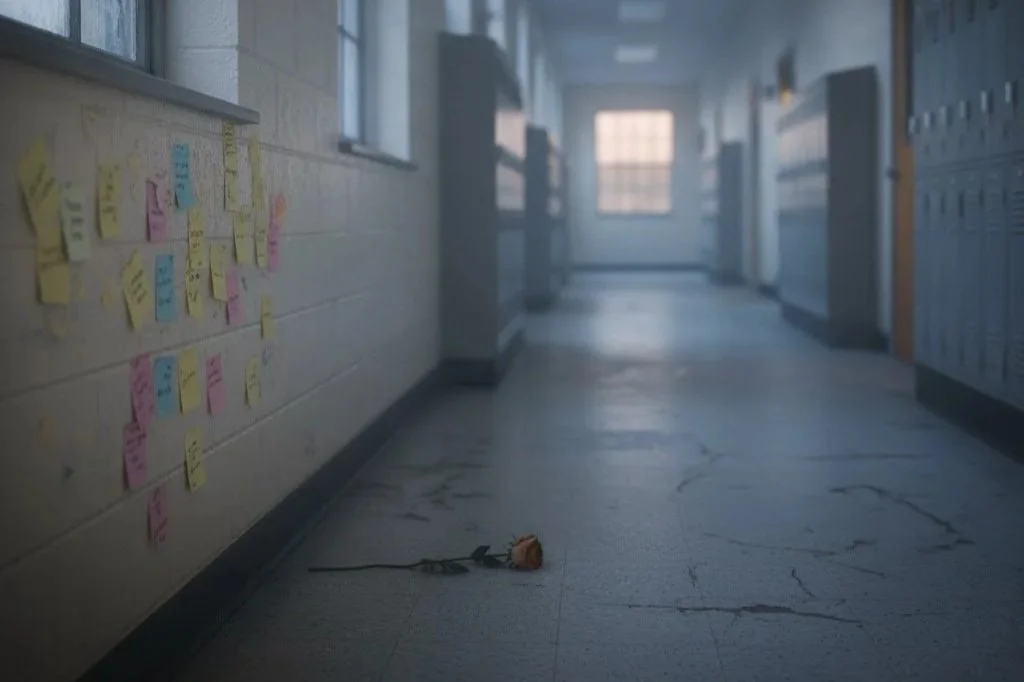

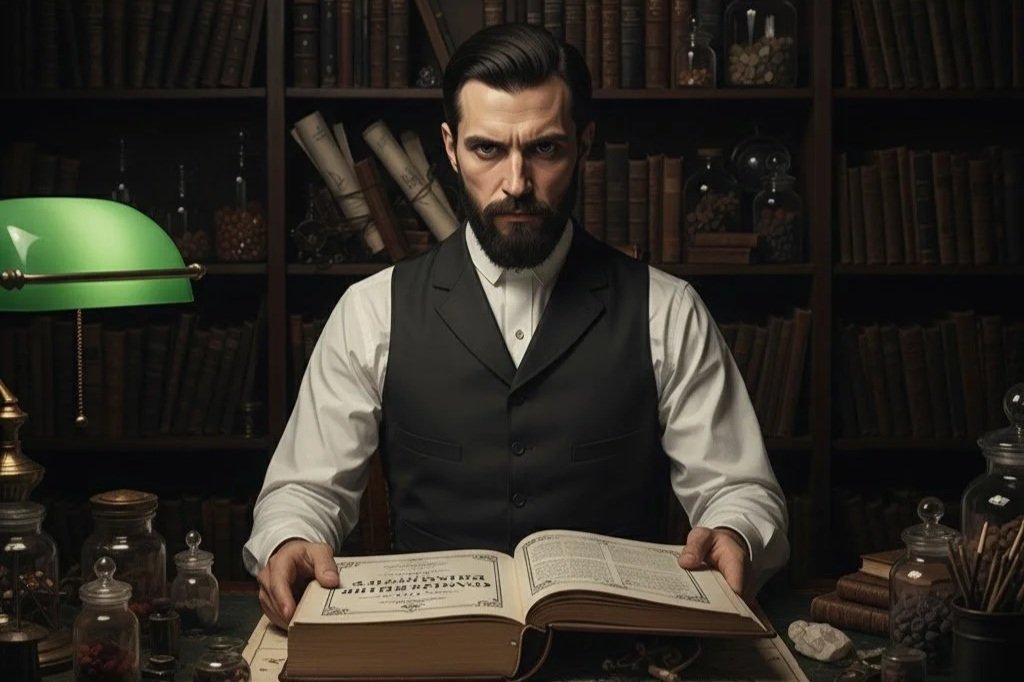

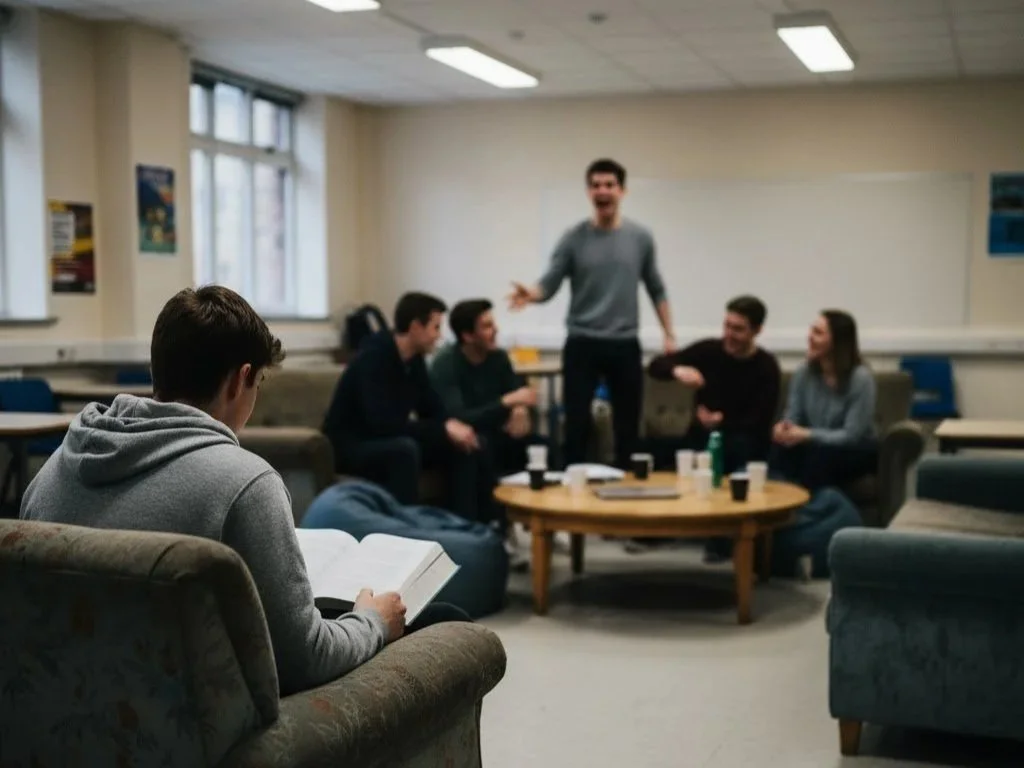


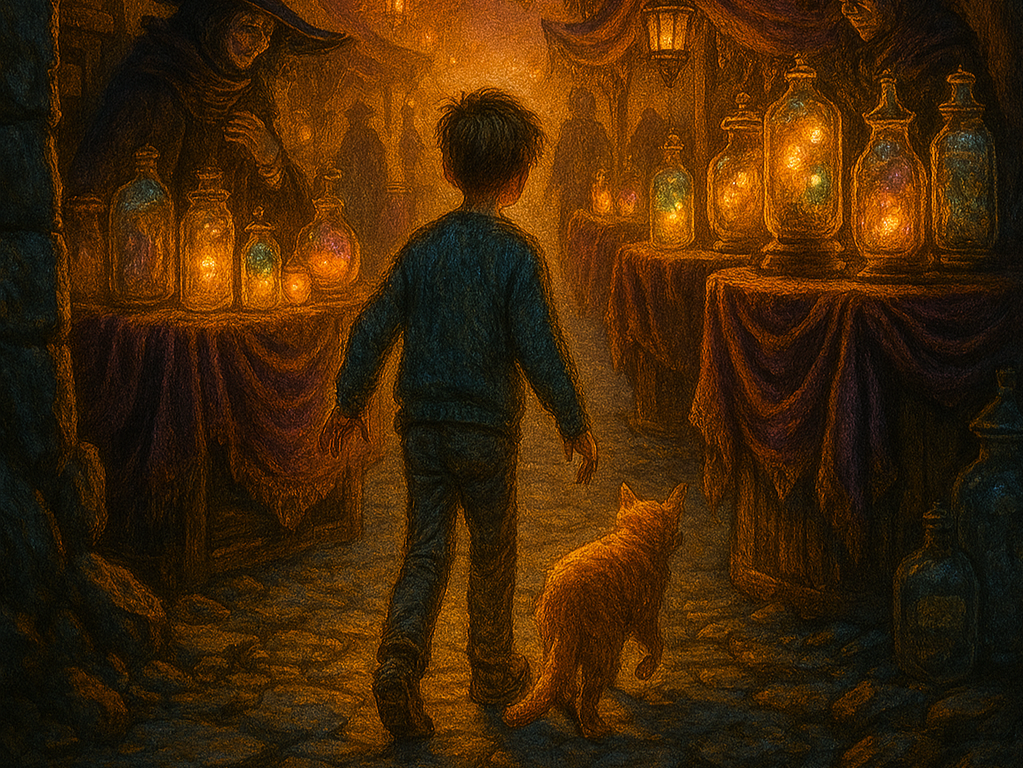
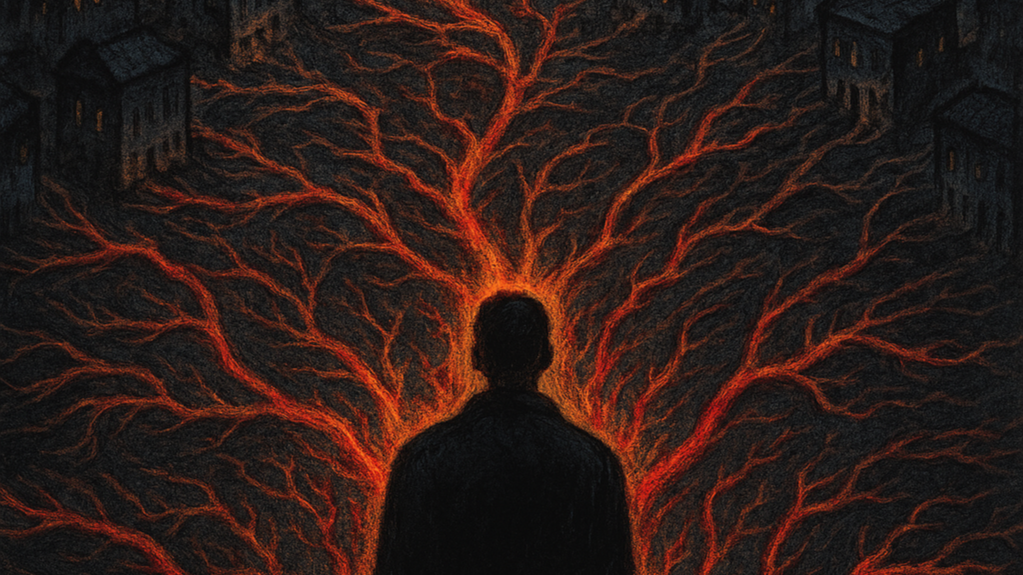





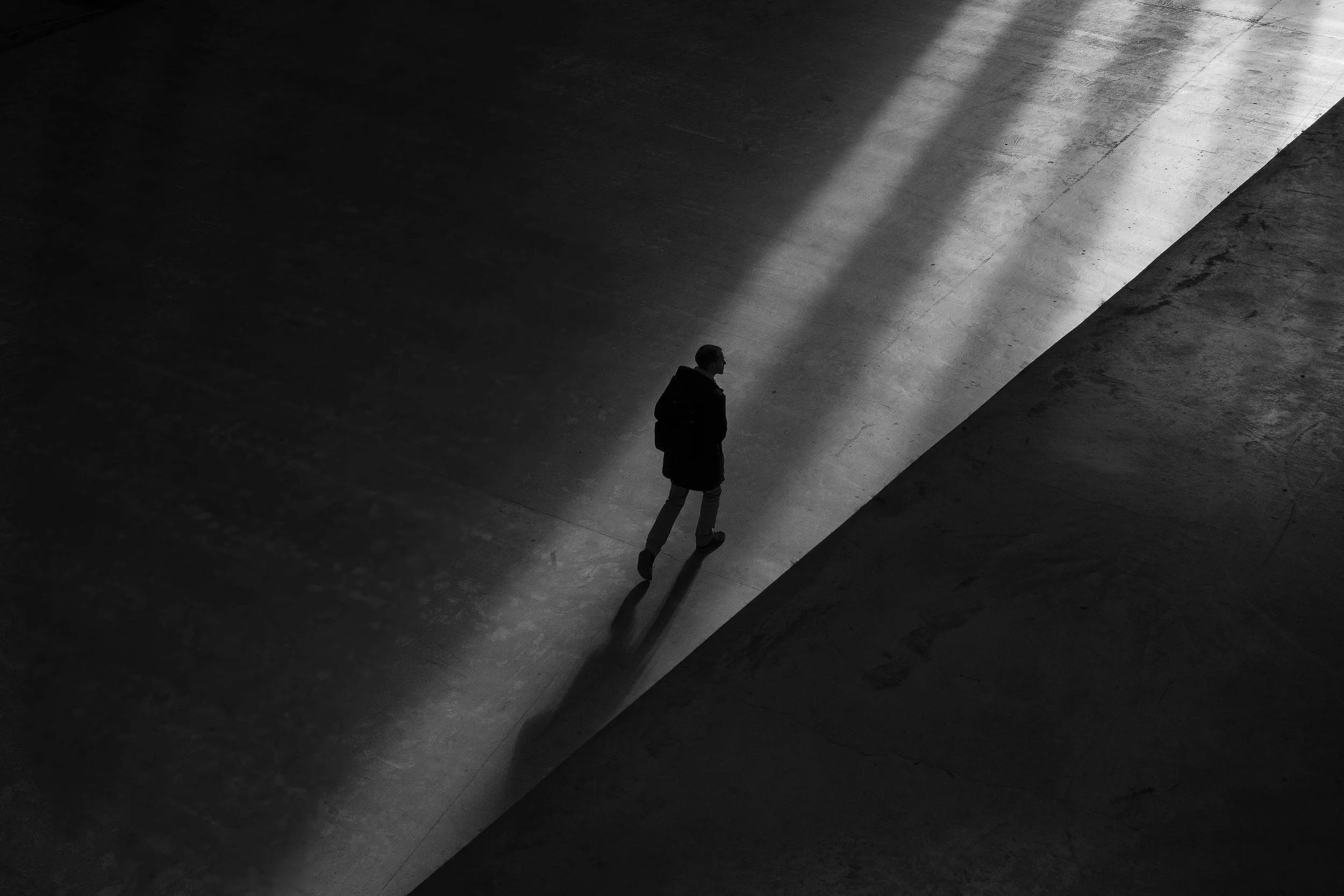







Some people move through the world making noise. Thirteen-year-old Leo has learnt to be still. But when an old illustrated book vanishes from the bookshelf, Leo discovers something extraordinary living in the walls of the Victorian house: the Snibbit, a small magical creature that collects beautiful things and understands that silence can be full of meaning. Through carefully preserved fragments from the past, the Snibbit teaches Leo how to navigate a world that isn't built for quiet people.